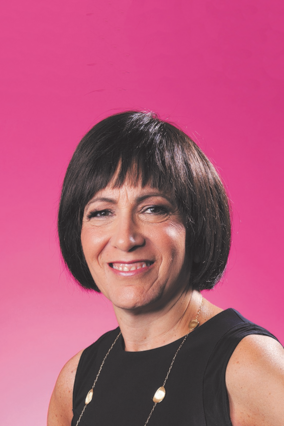
Leave a Legacy with Planned Giving

Research shows that adults make up to 35,000 conscious decisions in a single day. Today, we’re encouraging you to make an important one – planning your estate (with charitable giving!)
Estate planning may not seem easy to tackle, but the reality is: without a plan, you will be leaving a personal decision as to who receives your assets up to your state’s laws. And, you lose the chance to help causes that matter to you. By planning ahead, you can decide who receives your assets and make wishes possible, leaving a legacy and changing lives for years to come.
To make legal planning less overwhelming, our friend, Wendy K. Goidel, a longtime Make-A-Wish supporter and Estate Planning Attorney, is answering your (and our!) questions. With over 35 years of experience practicing law and 24 years concentrating in estate planning, she'll get you up to speed in no time!
Q: Why is it important to have a Will in place?
A: It is important to execute a Will if you want to control who receives your property and how the property will be distributed (outright or in trust to protect assets for the beneficiaries). Without a Will, your closest heirs at law will inherit your property through intestacy statutes. And those heirs may not be the individuals you would have chosen as beneficiaries of your estate.
Q: Why should I create a plan now?
A: You need to create a plan including instructions about how you want to be cared for should you ever become incapacitated, and how your assets should be distributed upon your passing. However, many people procrastinate and fail to engage in estate planning. They’re often in denial and find discussions about planning for potential disability and certain death unpalatable. Others perceive planning to be expensive. However, failure to plan will undoubtedly result in even more expenses in terms of legal fees and court costs. Believe me when I say that failing to plan will create different types of expenses - predominantly stress, anxiety, and frustration - on your loved ones. This is not the burden you want to place on your family.
Q: So, when should I start planning?
A: It’s never too early to start the process of estate planning! (As long as you are at least 18 years of age.) Many young adults start their initial plan after the birth of their first child. Then as they age and circumstances change, their legal documents need to change with them. Updates are typically required upon changes in their family, health, wealth, and tax laws.
Q: Why do you think it’s important to consider charitable giving in your estate plan?
A: If you have been a regular supporter of Make-A-Wish, your giving does not have to cease upon your incapacity or passing. Should you become incapacitated, you can instruct your agents to continue supporting Make-A-Wish during your lifetime. And, you can create a charitable legacy when you’re gone. If you anticipate passing away with a taxable estate, you can reduce or eliminate the amount you will ultimately pay to the government. Rather than paying estate taxes -- and letting the government decide how your funds will be allocated -- you can choose to leave the equivalent amount to Make-A-Wish and/or other causes of significance to you. This is your right to engage in social capital. There is almost nothing more personally rewarding than knowing that you’ll continue to make a difference in the lives of children and families fighting critical illness.
Q: What are some of the options to include Make-A-Wish in my estate plan?
A: There are several different ways! It is important to work collaboratively with your legal, tax, and/or financial advisors to discuss your charitable and non-charitable goals and various options for meeting them to see what’s best for you. Here are some options:
- Charitable Remainder Trust (CRT): This is an irrevocable trust created for charitable purposes. You can reduce or eliminate estate taxes upon death by transferring highly appreciated property – such as stocks and real property – to the trust. Once funded into the trust, the property is sold, and the proceeds are invested to produce a stream of income for you, the donor. Depending upon the terms of the trust, you will receive either a set amount of money per year or a fixed percentage of the value of the trust for a term of years or for your lifetime. At the end of the term, the remaining amount in the trust would be distributed to Make-A-Wish. Additionally, upon making the gift, you will receive an immediate charitable income tax deduction based upon the value that would ultimately be given to Make-A-Wish.
- Charitable Lead Trust (CLT): Like a CRT, the CLT is funded with appreciated property. However, in a CLT, Make-A-Wish would receive the income stream for a term of years. Once the term has passed, the individual beneficiaries you have named in the trust agreement – such as your children -- will receive the remainder. This can be an excellent way to support Make-A-Wish, but still leave a legacy for your loved ones. You will also receive a deduction for the value of the charitable gift that is made. This will offset the gift or estate tax that may be owed when the remaining amount is distributed to your beneficiaries.
- Gift Annuity: A gift annuity is essentially a contract between you and Make-A-Wish. According to the contract, you agree to donate a certain amount of cash or property and Make-A-Wish would invest your gift and agree to pay you a fixed annuity either monthly or quarterly for the remainder of your life, or the combined lives of you and your spouse. Upon your death, or the death of you and your spouse, Make-A-Wish will receive the balance from the investment of your gift. Because a gift annuity is a contract between two parties, it can only be used to benefit one charity. Like the CRT, gifting cash or property to Make-A-Wish removes a large amount of money or property from your estate, thereby reducing the estate taxes due upon your passing.
- Private Foundation: If you have a large amount to donate and you want to retain as much control as possible, a private foundation may be an option worth considering. This is an entity established with a charitable purpose and funded by donations from you and possibly other family members. The foundation – established as either a trust or a corporation -- distributes money to Make-A-Wish and/or other charities you choose. As the creator of the entity, you control the operations and make all decisions regarding who will run the foundation, which entities will receive the donations, and how much each will receive. Similar income and estate tax benefits can be achieved by donating to a private foundation.
- Donor Advised Fund: This is a fund created by you
,but owned by a nonprofit organization known as a “sponsoring organization.” Even though the sponsoring organization owns and manages the fund, you can designate Make-A-Wish and/or charities as beneficiaries of this fund and the amounts to be distributed. One benefit of this is that an income tax deduction may be taken in the year the donation is made to the fund, even if the money is not distributed to a charity that tax year. As with the other gifting strategies, the donated cash or property is not included in your taxable estate upon your death. - Outright Gifts: If you would like to donate a lump sum of money and do not need to receive a stream of income, an outright gift to Make-A-Wish may be the quickest and easiest solution. It also provides Make-A-Wish with the immediate benefit of the gift without any ongoing administration by either party. By making an outright donation, you can take advantage of an income tax deduction for that year and the value of the property is removed from your taxable estate upon your death. But
,be aware that any gifts made by a New York decedent within three years of death will be clawed back into the taxable estate. - Donating Retirement Assets: If you are over 72 years of age, you can transfer the required minimum distributions from your IRAs directly to Make-A-Wish to exclude the distributions from your taxable income. This is a good option if you have enough income from other sources and do not need or want the additional income. You can also name Make-A-Wish as the beneficiary of your IRA or other retirement accounts upon your death. Rather than leaving your retirement accounts to individuals who, with certain exceptions, must withdraw the full amount and pay income tax on the distributions by the end of the tenth year following your passing, Make-A-Wish will not have to pay tax on the income. This is an attractive option, as your estate will receive a tax deduction for the contribution and the full balance in your retirement account will inure to the benefit of Make-A-Wish.
With any of these charitable options, you can consider purchasing life insurance (and transferring the policy to an irrevocable trust) to offset the amount that would pass to Make-A-Wish, thereby leaving a financial legacy to your heirs.
Q: Why do you support Make-A-Wish?
A: I had the honor and privilege of serving for a decade on the Board of Directors of Make-A-Wish, Suffolk County, NY. Together with my fellow board members, we helped to raise millions of dollars to grant wishes. I also volunteered and worked with several wish families. There is nothing more gratifying than to experience the joy on a child’s face when their wish is revealed.
I chose to support Make-A-Wish for several reasons. First, the organization supports not just the wish child, but their entire family. The entire family is impacted by critical illness, and involving them in the wish planning and granting process benefits everyone. Second, the organization has local chapters, so all fundraising in each chapter benefits children residing in that chapter’s region. And third, unlike many not-for-profit organizations, about 85 percent of each dollar raised is allocated to the actual wish, rather than to administrative expenses.
Interested in including Make-A-Wish as part of your estate plan? We can help! Simply contact Lizzy Merkouris at emerkouris@metrony.wish.org or visit wish.org/newyork/planned-giving.
If you live in the Buffalo area, please contact Mary Hazel at mhazel@metrony.wish.org or 716-810-9474 ext 4526.
If you live in the Rochester area, please contact Donna Auria at dauria@metrony.wish.org or 585-213-5061.